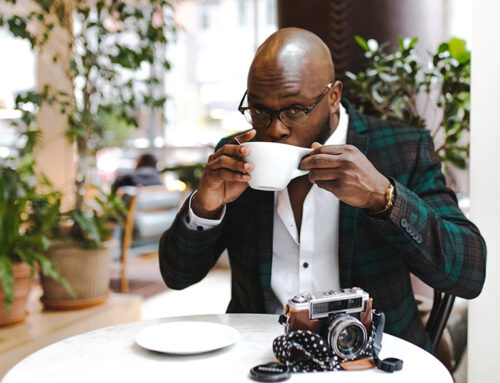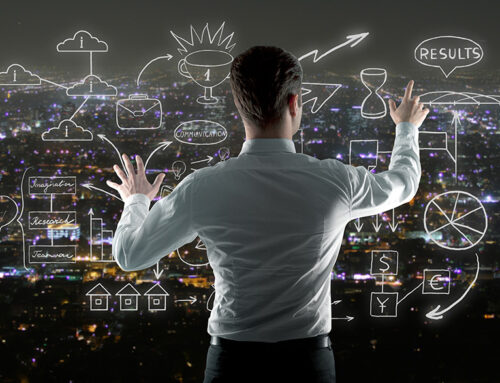
You are in a relationship with everything you come across in this life. However, it might not be in the way you expect. You’ll notice that throughout your life, your relationships have changed. You might not talk to your high school best friend anymore because there was a time in your relationship where their behavior was pissing you off. Or maybe you’re now friends with someone you snubbed in the past.
The relationships we maintain and how we feel about them has much less to do with the person or thing that we are connecting with, but rather how we think about that thing or person. All of what I cover in this episode also relates perfectly to your relationship with yourself. This fits into the Universal Truth, which I discussed at length in an earlier episode.
Join me on the podcast this week and discover how a real Alpha Male uses The Model in analyzing his relationships, focusing on the things he has control over. Once you understand this and cultivate a healthy relationship with yourself, the world is yours, my friend.
Are you ready to unleash your alpha but you’re not sure where to start? Enter to win one of five FREE 30-minute coaching sessions here.
What You’ll Learn from this Episode:
- How you are in a relationship with everything in this life.
- Why scarcity is the mindset of the Beta Male.
- The definition of “bad boys” and “nice guys” as Beta Males.
- Why there is no such thing as a toxic person.
- How we process other people’s behavior.
- 3 steps to take to get clear on your own behavior.
Listen to the Full Episode:
Featured on the Show:
- Learn how you can enter to win one of five FREE coaching sessions here!
- Sign up for Unleash Your Alpha, your guide to shifting to the alpha mindset.
Full Episode Transcript:
Welcome to The Alpha Male Coach Podcast, the only podcast that teaches men the cognitive mastery and alpha-mindset that it takes to become an influential and irresistible man of confidence. Here’s your host, certified life coach and international man of mystery, Kevin Aillaud.
What’s up, brothers. Welcome back to The Alpha Male Coach Podcast. I am Kevin Aillaud. Today, we are going to talk about relationships. So, last week, we talked about desires, we talked about urges, and this is a behavior. This is our relationship with our self.
And today, we’re going to talk about how relationships with other people, relationships with things, and even a little bit about our relationship with our own behavior is really just our cognition. It’s really just our thoughts.
So let’s go ahead and get started by starting with, what is a relationship? Guys, I want you to understand, to start, that all relationships is life. Like, everything about a relationship is life. You cannot be in this life without being in relation to it. We are in relation to everything we experience in every moment.
We’re in relationship with things. We’re in a relationship with people. We’re in a relationship with our own actions. And since both life conditions and human capacities are in a constant state of flux or a constant state of change, our relationships are always changing.
Now, the truth is, our relationships change because we change. And more accurately, it’s because our thinking changes. So a couple of quick things to start with, first of all, alpha male tenets, like I’ve given you guys some of these tenets.
The first is that the alpha male has knowledge of and maintains alignment with the universal truth. Now, I’m not going to go back into the universal truth. There are plenty of episodes on the universal truth. I did a whole six-episode series on the universal truth. You can go head and go back and listen to those. It’s episode four through nine.
But the other alpha male tenet I want to mention here on this episode is that we are not in a relationship with people or things or behavior. We are only ever in a relationship with our thoughts about people, things, or behavior.
And this is a big tenet in understanding the shift, the paradigm shift, that occurs as life conditions become more complex. As the complexities of life increase, one of the things that happens I our cognition has to go along with that complexity. So in other words, we can’t solve new problems with old thinking.
We really need to increase our ability to solve new problems and we need to make that shift as complexities increase and as our life conditions become more complex. So my goal is to define an undefined term, which is the alpha male.
You ask 100 people what an alpha male is and you’ll get 100 different answers. Now, I’ve read dozens of books on being an alpha man and they have no coherence with each other. They’re all different. They all have their own ideas.
So my goal here is really to define this term that has so far been undefined. I will say that old thinking in terms of the definition of an alpha male has something to do with his social dominance or physical dominance or relational dominance. And this type of thinking relies on scarcity principles.
So, scarcity is the mindset of the beta male. Now, I’m not throwing betas under the bus. Don’t get me wrong, I’m not judging the alpha versus the beta that one is better than the other. There are plenty of men who have a beta mentality and thrive in their world. All I’m doing is defining these terms.
And I’ve talked about bad boys before, I’ve talked about nice guys before; both present a mindset in relation to the other person. Both live in a mindset of scarcity and fear. I’m going to really expand on this in future episodes, but very quickly, just to extrapolate and clarify for you guys, the bad boy’s mindset, what they do is they raise their opinion of themselves in comparison with other people.
So they brag. They have this sort of arrogance, kind of a false confidence, instead of building themselves up, they put other people down often. They kind of have this idea of putting people down. They deny faults because they can’t tolerate rejection. There’s always something wrong with the other person, there’s nothing ever wrong with them, it’s just the other person’s fault. They often tend to lie or exaggerate about their accomplishments because their mindset is based in fear.
Now, the nice guy is kind of the other side of that coin. So what the nice guy does is they build other people up in comparison to themselves. They put people on pedestals. They might have low self-esteem. Not always, but typically the nice guy is going to have a little bit lower self-esteem.
They’re going to provide excessive compliments for the purpose of returned affections. They’re not giving genuine compliments, they’re just giving compliments so that the other person will give complements back. They fear rejection as well, but they do it differently. They’re people-pleasers, they’re approval seekers.
They are their own manipulators because their mindset is to kill the other person with kindness, like, I’m going to kill them with kindness, I’m going to be super nice. And their mindset is also based in fear.
Now, the alpha male shifts – this is the alpha male shift – from scarcity to abundance where a sustenance mindset moves into a being mindset. And this momentous leap in existence reveals the simple truth that there is only ever one relationship.
This is the difference between the bad boy and the nice guy who believes that there’s a relationship outside of himself and the relationship that the alpha male has where there’s only really one relationship; the relationship with yourself and your thoughts about the world. And the world is life, reality, existence, whatever you want to call it.
So really, what I want you guys to think about is kind of like the bad boy and the nice guy are two sides of a quarter and the alpha male is like a $100 bill. They’re two completely different values, they’re two completely different objects, but the bad boy and the nice guy are really the same, just on a different spectrum; basically, two sides on a linear progression.
So let’s get into relationships. There is only one relationship, and that’s the relationship that each of us has, the only one that offers us truth, which is the relationship between who we are and what we think. So understand that who we are is the awareness of what we think.
We are sometimes referred to as the observer of the mind or the observer of the thought. That is the self. Now, what we think, our thoughts, the sentences, is the brain doing its job as our human survival tool. The sentences in our head is not who we are. That is the conditioning we have received in order to make sense of the external world.
Who we are is the awareness of those sentences and the ability to create new sentences. That is the only way we are ever in relation to anything. So in relationships with people, what they say and what they do, we are not in relationship with them at all. We are not in a relationship with a person.
A person is neutral. What they say is neutral. What they do is neutral. Their behavior is neither right nor wrong. There’s no such thing as a toxic person. There’s no such thing as a negative person. There’s no such thing as a generous person or a kind person. There are no good people or bad people.
People are people. They’re neutral in the world. Our relationship with them is what we think about them. And you can take any person you know as an example. Take your mother, your father, your wife, your girlfriend, your boss, your buddy. Each of these people has a specific relationship with you. However, each of these people also has an entirely different relationship with other people in their lives.
Now, are they different people? Is your boss a different person with you than he is with his brother? No, he is the same person. He may behave differently because of how he thinks about you versus how he thinks about his brother, so the relationship is different. But he is still the same man. He is still the same being.
Similarly, you have different relationships in your life where you behave differently based on how you think about the person with whom you are in a relationship with. And each of them will have their own thoughts about who you are.
None of their thoughts are reality. None of them have a true completely integrated picture of who you are in your entirety. And that is because you behave a certain way with them based on your thoughts about them, and they behave in a certain way about you based on their thoughts about you.
So we aren’t ever in a relationship with people. We’re only in a relationship with our thoughts about people. And the best news is – guys, this is the truth – your thoughts can change in a moment. You get to choose how you want to think.
So ask yourself, has this ever happened to you? Have you ever had a best friend who you felt betrayed by and then never spoke with them again? That person had one action and all of a sudden, your thoughts about him completely changed. Or on the flip side, have you ever met someone who you didn’t like at first, and as you got to know them, or as you got to think more about them, decided that they weren’t so bad after all?
Now, this is your mind. This is your thinking that is changing the relationship. The person isn’t changing. Your thoughts about them is what’s changing. So relationships with people are always in flux because people are dynamic beings. People have the ability to evolve existentially by going through major changes in existence that can increase their ability to deal with greater complexities in life.
Our relationship with things is rarely so dynamic, yet it is still only our relationship with our thoughts. So take anything anatomic, like a computer, a phone, a bed, a chair, whatever. My relationship with these items is only my thoughts about them.
So, I use an iPhone. I use it because it’s familiar to me. The iPhone itself is completely neutral. It is what it is. I like it. someone else will have a different relationship with it. They might prefer an Android. They might not like the iPhone and state their reasons why, but their reasons are just their thoughts. They’re not facts.
So our relationship with these items is only our relationship with our thoughts about these items. It’s not facts, like these items aren’t factual in what we think, it’s just our opinions about them, and that creates our relationship.
Now, finally, we have a relationship with our behavior as well. The behavior of other people is our thoughts about them, so it’s neutral. But we have a relationship with our own behavior. The actions that we take in the world lead us to the results that we get from the world. This is a cause and effect relationship.
Our relationship with our behavior is still our thinking about what we do, and quite often the way we think about ourselves is the way we think about our behavior. So when you judge the behavior of other people, you aren’t judging them, you are comparing their behavior to your behavior.
Therefore, you’re always really thinking about yourself and what you do in the world relative to what other people do. And I don’t want to make this confusing – my goal is to make it simple for you guys – so what I’m going to do is go back to the Model.
I’m going to go back to the universal truth. Like I said, I introduced the Model in previous episodes, you can go back and listen to those. I’m not going to re-explain it, but check this out. Here we go, other people, their words, their behavior, other people are circumstances.
They are out of our control and completely neutral. As I explained earlier, they’re neither good nor bad, right nor wrong. Things in the world are circumstances also; the cup, the desk, the computer, the phone. These are all circumstances existing neutral in the world. Your relationship with people and things don’t come into being until you have a thought about them.
So people you don’t know, like the guy living in Thailand on the other side of the world, you have no relationship with because you have no thoughts about him. He exists nonetheless. He’s out there and all his words and actions are neutral.
If you meet him and begin to have thoughts about the person you think he is, that is when he becomes generous or kind or greedy or toxic or optimistic or compassionate or whatever. And that is when your relationship with him begins.
But our relationships are only thoughts about people. They’re not with other people themselves. Relationships with things are the same. I have a different relationship with the phone I own than with the phone my friend owns. I can give my phone to my friend, and my relationship with my phone changed. The phone didn’t change.
It’s still the exact same phone, but all of a sudden, it’s not my phone, it’s now my friend’s phone and my relationship changes because my thoughts about it changed. So all relationships really only exist in the T-line of the Model. They’re only thoughts, not the C-line, they are not circumstances.
Relationships are not circumstances; relationships are thoughts about circumstances. Our behavior is in the A-line of the Model, because our behavior is our actions. I’m talking about our actions, not the actions of other people. The actions of other people are circumstances.
Our actions are driven by our emotions, and our emotions are created by our thoughts. So our behavior is directly determined by our thinking. How we think will determine our behavior. Now, in addition to that, our actions determine our results and the results we create in our lives will reinforce the original thinking that led to those results.
So our behavior is the effect of our thinking and it can be the cause of our thinking. The relationship we have with our behavior will reinforce the relationship we have with ourselves, and here, guys, is where confidence enters into the picture.
So confidence is trusting yourself to do what you say you’ll do. It’s having your own back. It is thinking positively about yourself. It’s sticking to your word. It’s having integrity of yourself. It’s knowing you can handle any situation that life presents. Whatever life presents to you, you can handle it.
When you develop your confidence, your behavior is driven deliberately by your thinking. When you lack confidence, you can become a slave to your behavior. This is where habits and addictions can start to creep in and take a hold of your life.
So remember, habits and addictions aren’t good or bad. You get to choose whether they’re good or bad based on the results that they create in your life. There can be good habits because they create good results, or they could be bad habits because they create bad results. But it’s up to you to decide whether a habit is good or bad.
Now, our relationship with our behavior is really our relationship with our self. The more confidence we have, the more we are able to control our actions. The more we lack confidence, the more difficult it is to take cognitive control over our emotions and actions.
So check this out, guys, when we feel shame, when we feel guilt, anger, sadness, hate, or fear, there is a tendency to create behavior we will later regret. And that causes harm to ourselves and others because, when you look at your behavior to determine your results and observe your behavior in relation to how it makes you feel, you can take ownership of your actions and your cognition.
When you have those positive emotions that are driving those positive actions that you want to take and you’re getting the results you want, that’s where that confidence comes in. When you have those negative emotions, that is where you want to start paying attention to the thinking that is creating that, or even just how that behavior is reinforcing the thinking, and then decide if you want to change it.
The relationships we have with other people and other things will give us access to the relationship we have with our self as well. So to understand and develop the relationship you have with yourself, the thoughts that you have about yourself, you can approach it in two ways.
You can do two things. Number one, you can be keenly aware of how you feel about your behavior and how your behavior reflects on your mind. We talked about this in the last episode, guys. Remember, when we talked about urges, when we talked about desires that you kind of lose control over, these habits or addictions that you feel have taken over your life, if they are leading to results that you don’t want, then you can start to be aware of how that behavior is making you feel.
Is that behavior reinforcing thoughts that create shame, thoughts that create guilt, thoughts that create anger with yourself or that deplete confidence in yourself? Or are those behaviors creating results that are reinforcing positive thoughts about yourself, thoughts about how amazing you are, thoughts about how confident you are, how you can trust yourself, how you’re able to stick by your word?
Because your behavior will determine the results in your life, that’s the cause and effect relationship – whatever we put into the world, we get back from the world. That’s our action and our result, cause and effect.
If you are happy with those results then your behavior is in line with what you want for your life. Boom, good to go, that’s it. If you are not happy with your results, this is where you want to drive some awareness.
For example, if you hide from yourself or others, if you lie to other people, which indicates that you’re not proud of who you are – if you’re lying to other people then you’re hiding yourself from other people – if you want things that you don’t have, if you imagine a version of yourself that is different than the person you behave to be.
So if your mindset – if you have a better version of yourself in your mind than who you are in reality, then you don’t have the results that you want in your life. You want that person you imagine yourself to be to be the person you are. If you’re in a condition of confusion about life or the world, if you’re having sort of an existential breakdown, which I’m going to talk about in later episodes, or if you engage in behavior compulsively that you want to stop or cut back on but you haven’t been able to, you haven’t been able to get control of that behavior, then you can begin to become aware of the thinking and emotions that drive the behavior leading to those results.
The first step, guys, is to become aware. And we’re just talking about your own behavior, the first step is to become aware. It’s to notice the results that you’re getting and the emotions that you’re feeling about the behavior that you have.
Once you become aware, the second step, and almost a more difficult step than even awareness, is to hold yourself in a state of curious compassion, because a lot of people will jump straight to blame and judgment. They’ll start to blame themselves for their behavior. They’ll start to regret their decisions.
So instead of doing that, instead of adding more suffering to an already suffering system – because you’re already suffering cognitively instead of dumping more suffering and blame and judgment onto yourself, just kind of be curiously compassionate with yourself. Just observe your behavior, observe your mind, and observe what’s happening in your body, observe those emotions, those vibrations that occur in your body.
And then finally, guys, the third step is to be open to ask for help from people who have the knowledge of a process to facilitate change. There’s nothing wrong with asking for help. That’s what coaches are for. That’s why I am here.
Your car breaks down, you don’t sit there and try to fix it. You don’t spend the next three months trying to figure out how to fix your car. You take it to a mechanic. If you are having health problems, you would tend to go to the doctor; someone who has the knowledge to facilitate a process for change.
So in the same way, once you become aware that your behavior creating results you don’t want, and second, you become aware of the thoughts and emotions that that behavior is creating without blame and without judgment on yourself, then be open to ask for help.
The second thing you can do is when you find yourself in a relationship with other people. So when you’re in a relationship with another person, you can listen intently to your mind while you engage with the other person. Become aware that the other person you are with, that you’re standing there, you’re engaging with, is neutral. What they say, what they do, is neutral. You become aware of that first, that they are living and behaving according to their own thinking which has nothing to do with you.
Their thinking has to do with how they view the world and how you engage with this person is based on your thoughts about them, which is completely in your control, and a reflection of how you view the world.
So remember, you don’t see things the way they are. You see things the way you are. That is how we interpret the world. We don’t interpret the world in a neutral way. We interpret the world based on the judgments that we have conditioned ourselves to have over time, over our lives.
So when you engage with other people, recognize that you are not in a relationship with them. You are in a relationship with your thoughts about them while they are in your presence. You’re only in a relationship with your mind, with your thoughts.
So actively listen to what they say and be attentive to what they do, but realize that your thoughts are not a measurement of them, but a measurement of you. Now, both of these processes is a matter of mind management.
Both of these processes is based in cognition and awareness. The elevated alpha male takes this momentous leap from animal, sustenance living in fear and scarcity believing that the external world is what is responsible for reality, to the human being living in confidence and abundance, knowing that the external world is only a reflection of the internal world and reality is what you choose it, what you think it to be.
Alright, guys, that’s what I’ve got on relationships. Just to kind of summarize and put you guys out there at the end, this is what a relationship is. It is your thoughts. It is your cognition. You’re always only in a relationship with your thinking about the world, about other people, and about your past.
Everything is a thought. And the best part is, you get to choose what you think. You are completely in control of your mind. If this is helping you, if you guys are loving this podcast, do me a favor, do me a big one, go to iTunes, leave a five-star rating, leave me a review. Only a couple more episodes left and I’m going to do a drawing to where one person who has left me a review is going to get some free coaching.
Now, coaching is completely different than what you hear on the podcast, because what you hear on the podcast is teaching. I’m teaching, I’m just giving you guys the methodology. Coaching applies the methodology directly to your life. So it’s a very, very powerful process. It’s a very, very life-changing process.
And I’m going to talk more about that in the next episode, really what exactly it is that I do so that there is no misconception about what I do. But I would really love it if you guys would go and leave me a review on iTunes.
And as always, guys, you are alpha men. You are alpha men. You guys are amazing, wonderful badasses. I love every one of you. Unleash your alpha.
Thank you for listening to this episode of The Alpha Male Coach Podcast. If you enjoy what you’ve heard and want even more, sign up for Unleash Your Alpha – your guide to shifting to the alpha mindset – at thealphamalecoach.com/unleash.









